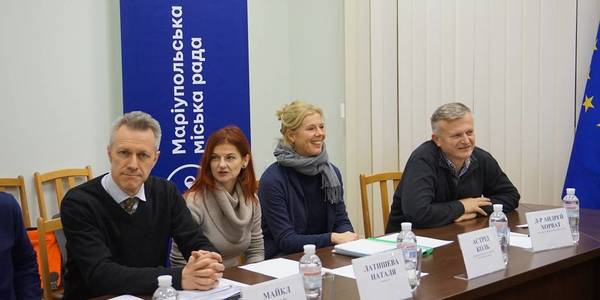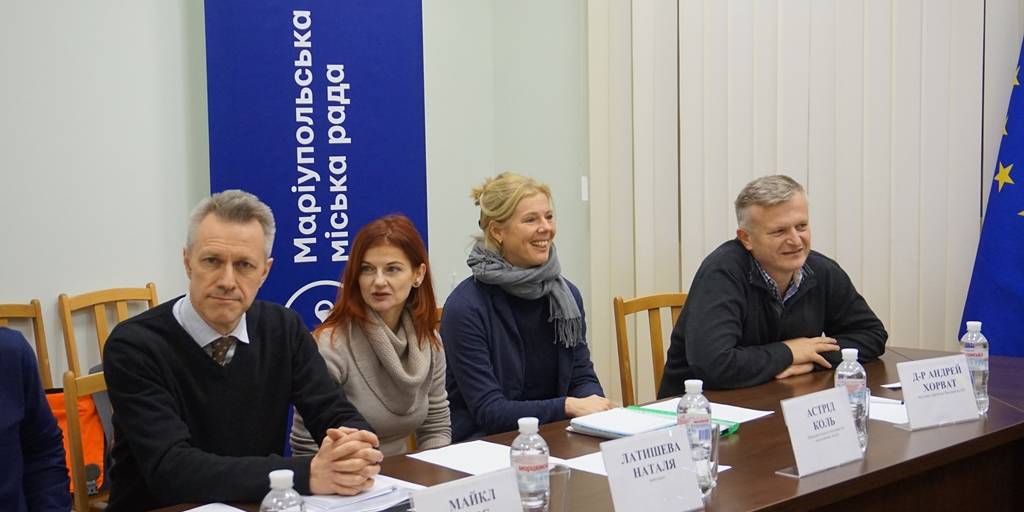U-LEAD with Europe Programme plans to strengthen its support in Azov Sea region
Mariupol, the largest city on the Donetsk Oblast’s territory controlled by the Ukrainian authorities, is actively working on the issue of amalgamated hromada formation. The law, adopted in May last year, which simplifies AH formation around cities of oblast significance by accession of adjacent territories, allowed to accelerate this process. The U-LEAD with Europe Programme and the Donetsk Local Government Development Centre, established with its support, play an important role in the implementation of decentralisation in the south of the Donetsk Oblast. According to Stepan Makhsma, Secretary of the Mariupol City Council, due to joint work, MinRegion hears the needs of Mariupol, it became possible to introduce changes to the Perspective Plan, taking into account the wishes of the residents. According to the latest changes, the Mariupolska urban hromada should adjoin the surrounding rural areas of the Berdyansk, Pokrovske and Staryi Krym village councils.
Mariupol was identifying priorities for strengthening cooperation with the U-LEAD with Europe Programme – this was the goal of the December visit to the city of the Programme delegation and representatives of the EU Anti-Corruption Initiative in Ukraine. During the meeting with the city leadership, and later the representatives of the Mariupol Development Fund further steps to implement decentralisation and opportunities for enhancing donor cooperation in the Azov Sea region were discussed. The team of the Donetsk Local Government Development Centre took part in the discussion as well.
Given the latest situation in the Azov Sea, European donors have decided to strengthen the support of the Azov Sea region, therefore, they came to learn the type and directions of assistance needed by Mariupol regarding regional development issues.
“We are proud that the U-LEAD with Europe Programme can support decentralisation in Ukraine, that it is tangent to reforms and regional development,” said Andrej Horvat, Deputy GIZ Programme Director.
During the conversation, representatives of the Programme got acquainted with small and medium business support programmes, situation with the seaport and other issues of Mariupol development. The city officials told the guests about their experience of attracting international funds to solve problems in the city.
Particular attention was paid to the discussion of the Strategy for Socio-Economic Development of the City for 2017-2021. Representatives of the city council shared the ways they worked on each of the document points, took into account the interests of the residents, sought directions to develop the city. The essence of this strategy is to make municipal services more accessible and high-quality ones. The next Strategy will be a strategy of opportunities, that will envisage culture, history, and ecology development.
Discussing the prospects for the formation of the Mariupolska AH, the difficulties related to the administrative-territorial system were mentioned. Despite all this, Mariupol was the first city in the Donetsk Oblast that decided to invite rural hromadas to join the city,” said Artem Vivdych, Director of the Donetsk LGDC. “At the same time Mariupol proposed options for the development of those territories that will join the city. A new challenge is the Mariupol Rayon creation over time. We will have to find common ground between the industrial city and surrounding agricultural areas, as well as seek a common vision of development.”
The Europeans also met with Mariupol Development Fund representatives – it became the only one in the Donetsk Oblast that worked in the past year and will continue working within the U-LEAD project for NGOs.
Due to the Programme’s support, the Mariupol Development Fund implemented the “School of Active Citizens” project, where teachers, parents of schoolchildren, physicians from potential Mariupolska and Sartanska AHs learnt about decentralisation, sectoral reforms, and options for improving municipal services. In future, the Mariupol Development Fund plans to work with potential Nikolska and Kalchytska AHs – agricultural areas bordering with the industrial city. “Mariupol is interested in the development of these hromadas, since they deliver products to the city, farmers sell grain through the port,” said Tetyana Lomakina, Director of the Mariupol Development Fund.
“As a result of the recent events at sea, Mariupol has become an important city for the European Union – and this is a positive side of the problems,” said Andrej Horvat. “The EU wants to increase its assistance to the Azov Sea region in the directions of the Programme’s work in other regions. We can provide technical assistance in support of municipal services, preparation of Development Strategy, study of international experience”.

Attached images:
Область:
Донецька область Запорізька областьSource:
Програма «U-LEAD з Європою»

20 December 2024
Вакансія: Полісі Координатор/-ка (англ.)
Вакансія: Полісі Координатор/-ка (англ.)
Опис контексту SALAR International завершила свої поточні проєкти в Україні (DSP та PROSTO), які були...
20 December 2024
Ветеранська політика в громадах: як це працює та які можливості може використати місцева влада
Ветеранська політика в громадах: як це працює...
Після демобілізації, поранення, повернення додому, ветеранів та ветеранок зустрічають громади. За те, щоби військові...
20 December 2024
Набув чинності закон, який дозволяє комунальним підприємствам використовувати гуманітарну допомогу
Набув чинності закон, який дозволяє комунальним...
18 грудня 2024 року набув чинності Закон України «Про внесення змін до статті 15 Закону України «Про гуманітарну...
20 December 2024
Як зміна механізму зарахування ПДФО вплине на бюджети територіальних громад - дослідження
Як зміна механізму зарахування ПДФО вплине на...
Дві третини доходів від ПДФО надходять до бюджетів тих громад, де люди працюють, а не живуть. Якщо змінити цю систему...